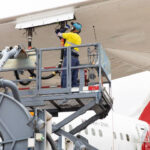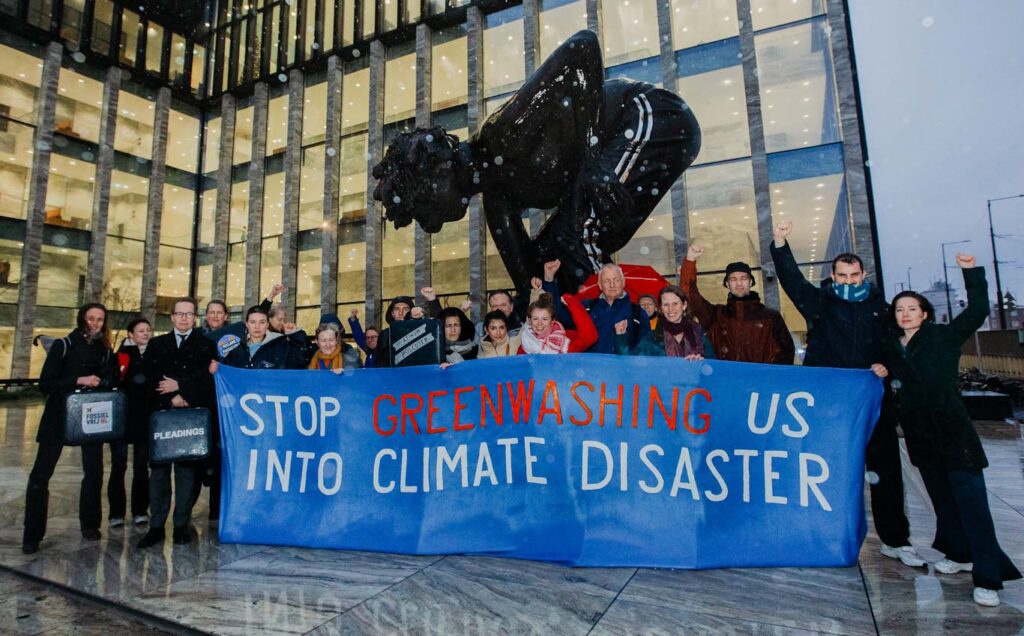A Dutch court has found against KLM in a sustainability advertising case brought by local environmental NGOs Fossielvrij and Reclame Fossielvrij. With legal support from environmental law charity ClientEarth, the claimants alleged the airline’s marketing breached the EU Unfair Commercial Practices Directive. According to ClientEarth, the judgment ruled that KLM’s claims suggesting flying can be or is becoming sustainable, as well as advertising suggesting the use of sustainable aviation fuels and carbon offsetting reduce or compensate for the climate impact of flying, “are misleading and therefore unlawful”. Meanwhile, another European NGO, Opportunity Green, has submitted a written statement to the International Court of Justice, asking it to confirm States have legal obligations under international law to tackle climate impacts from international aviation and shipping in accordance with the Paris Agreement’s 1.5°C temperature goal.
In the case heard by the District Court of Amsterdam, KLM’s claims that it was committed to the Paris Agreement’s climate goals were also found to be unlawful, said ClientEarth, as the feasibility of the airline’s targets painted “too rosy a picture”. The court said the term “sustainable” to describe alternative aviation fuels, or SAF, was not concrete enough to be promoted as a promising solution to the industry’s emissions.
Specifically, it found, according to the judgment (ClientEarth’s English translation here): “At the moment, SAF’s share of total fuel consumption, and hence CO2 emissions reduction, is still very limited due to various reasons. A more substantial share can only be expected in the distant future, and thus uncertain. The expression is therefore misleading.”
On promoting to customers the option to offset the climate impact of their flights by paying towards reforestation schemes, the court said “there is no direct link between customers’ tangible contribution and the CO2 emissions from their flights.”
Commenting on the the outcome, Johnny White, a lawyer at ClientEarth, said: “The truth has always been that sustainable aviation fuels or offsetting products risk justifying more emissions than they can ever save. All airlines and other companies making claims about their products’ environmental impacts that are based on offsetting should take heed from this ruling.
“Companies that publicly advertise commitments to the climate goals of the Paris Agreement must now ensure that those claims are feasible and concrete, or risk losing in court. This judgment is nothing short of a wake-up call for highly polluting industries and companies that try to sell the image of commitment to the Paris climate goals without having the plans to get there. It leaves the airline industry’s climate PR strategy dead in the water.”
The case was first filed in July 2022 and KLM had since retracted its advertising claims in response to the lawsuit. The court therefore did not see the need to issue further orders sought by the claimants, and ruled a ban on future similar claims was too uncertain. As the court found mainly against KLM, it ordered the company to pay the claimants’ costs.
“Tackling greenwashing is currently a cat-and-mouse game,” said Fossielvrij Reclame campaigner Rosanne Rootert. “Just when one misleading campaign is stopped, ten more pop up. You can only react when the harm is already done – people have already seen the ads. A complete ban on fossil advertising, such as for air travel, is the only way to truly eliminate greenwashing by these companies. Lawsuits like this would then be unnecessary.”
ClientEarth said the judgment had set a major legal precedent, with ramifications across the international aviation sector and for all companies advertising their commitment to the Paris Agreement.
Meanwhile, the world’s highest court, the International Court of Justice (ICJ), has been requested by the UN General Assembly to issue an advisory opinion that clarifies States’ obligations with respect to climate change under international law, with March 22 the deadline for written submissions. Aviation and shipping environmental NGO Opportunity Green has made a submission asking the ICJ to confirm that States should be tackling the climate impacts of emissions from international aviation and shipping (IAS) in accordance with the Paris Agreement’s climate goals. The two sectors account for nearly 5% of global GHG emissions, more than half of which are from the sectors’ international activities.
The lobby group says IAS emissions have so far “sailed under the radar” of UNFCCC negotiations, with the majority of States not accounting for them in their nationally determined contributions (NDCs) under the Paris Agreement, with States relying instead on action by International Civil Aviation Organization and the International Maritime Organization. This, says Opportunity Green, is a misconception, yet it is what most States do in practice.
Opportunity Green’s submission argues that the efforts of ICAO and IMO are additional to action under States’ individual NDCs and that it is not enough to leave the decarbonisation of the two industry sectors, which it says are weakly regulated, to the two UN agencies.
“With a new, stronger round of NDCs due in 2025, this is a watershed moment to put these sectors on a clearer course towards net zero,” said Isabela Keuschnigg, Legal Officer at Opportunity Green. “The science is clear in that we need rapid and deep transformations across all sectors and systems immediately. In the face of inadequate action taken to date, we urgently need clarification of States’ legal obligations to mitigate emissions from international aviation and shipping under the Paris Agreement.
“We’re urging the ICJ to confirm that international law obliges individual States to act decisively to address the substantive emissions from these sectors.”
Photo (Laura Ponchel, Fossielvrij NL): Campaigners celebrate court ruling on KLM case














More News & Features
Catagen launches SAF production company and signs offtakes with Ryanair and Shell
NATS survey shows a continuing disconnect of public attitudes to the environmental impact of flying
SWISS integrates first supplies of Synhelion solar SAF into flight operations
Aviation and fuel industries call for urgent EU policy action on SAF deployment
Air France-KLM becomes the first airline group to join the new EU flight emissions labelling scheme
New Deloitte study for A4E finds Europe’s airlines at competitive risk over SAF mandate